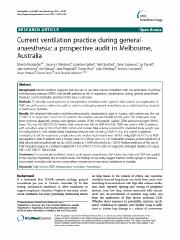Please use this identifier to cite or link to this item:
https://ahro.austin.org.au/austinjspui/handle/1/12424| Title: | Current ventilation practice during general anaesthesia: a prospective audit in Melbourne, Australia. | Austin Authors: | Karalapillai, Dharshi ;Weinberg, Laurence ;Galtieri, Jonathan;Glassford, Neil J;Eastwood, Glenn M ;Darvall, Jai;Geertsema, Jake;Bangia, Ravi;Fitzgerald, Jane;Phan, Tuong;OHallaran, Luke;Cocciante, Adriano;Watson, Stuart;Story, David A ;Bellomo, Rinaldo | Affiliation: | Department of Anaesthesia, Austin Hospital, Melbourne, Australia Intensive Care Research, Austin Hospital and Co-director, Australian and New Zealand Intensive Care Research Centre (ANZIC-RC), Melbourne, Australia ; Department of Epidemiology and Preventive Medicine, Monash University, Melbourne, Australia University of Melbourne, Melbourne, Australia Department of Anaesthesia, Western Health, Melbourne, Australia Department of Anaesthesia, Monash Medical Centre, Melbourne, Australia Department of Anaesthesia, St Vincents Hospital, Melbourne, Australia Department of Anaesthesia, Alfred Hospital, Melbourne, Australia Department of Anaesthesia, Northern Hospital, Melbourne, Australia Department of Intensive Care, Austin Hospital, Melbourne, Australia Department of Anesthesia, Royal Melbourne Hospital, Melbourne, Australia Department of Anaesthesia, Box Hill Hospital, Melbourne, Australia Department of Intensive Care, Austin Hospital, Melbourne, Australia ; Department of Anaesthesia, Austin Hospital, Melbourne, Australia |
Issue Date: | 1-Oct-2014 | Publication information: | Bmc Anesthesiology 2014; 14(): 85 | Abstract: | Recent evidence suggests that the use of low tidal volume ventilation with the application of positive end-expiratory pressure (PEEP) may benefit patients at risk of respiratory complications during general anaesthesia. However current Australian practice in this area is unknown.To describe current practice of intraoperative ventilation with regard to tidal volume and application of PEEP, we performed a multicentre audit in patients undergoing general anaesthesia across eight teaching hospitals in Melbourne, Australia.We obtained information including demographic characteristics, type of surgery, tidal volume and the use of PEEP in a consecutive cohort of 272 patients. The median age was 56 (IQR 42-69) years; 150 (55%) were male. Most common diagnostic groups were general surgery (31%), orthopaedic surgery (20%) and neurosurgery (9.6%). Mean FiO2 was 0.6 (IQR 0.5-0.7). Median tidal volume was 500 ml (IQR 450-550). PEEP was used in 54% of patients with a median value of 5.0 cmH2O (IQR 4.0-5.0) and median tidal volume corrected for predicted body weight was 9.5 ml/kg (IQR 8.5-10.4). Median peak inspiratory pressure was 18 cmH2O (IQR 15-22). In a cohort of patients considered at risk for respiratory complications, the median tidal volume was still 9.8 ml/kg (IQR 8.6-10.7) and PEEP was applied in 66% of patients with a median value of 5 cmH20 (IQR 4-5). On multivariate analyses positive predictors of tidal volume size included male sex (p < 0.01), height (p = 0.04) and weight (p < 0.001). Positive predictors of the use of PEEP included surgery in a tertiary hospital (OR = 3.11; 95% CI: 1.05 to 9.23) and expected prolonged duration of surgery (OR = 2.47; 95% CI: 1.04 to 5.84).In mechanically ventilated patients under general anaesthesia, tidal volume was high and PEEP was applied to the majority of patients, but at modest levels. The findings of our study suggest that the control groups of previous randomized controlled trials do not closely reflect the practice of mechanical ventilation in Australia. | Gov't Doc #: | 25302048 | URI: | https://ahro.austin.org.au/austinjspui/handle/1/12424 | DOI: | 10.1186/1471-2253-14-85 | Journal: | BMC anesthesiology | URL: | https://pubmed.ncbi.nlm.nih.gov/25302048 | Type: | Journal Article | Subjects: | Anaesthesia Intraoperative ventilation PEEP Tidal volume Adult Aged Anesthesia, General.methods Australia Cohort Studies Female Humans Male Medical Audit Middle Aged Positive-Pressure Respiration.methods Prospective Studies Respiration, Artificial.standards.trends Respiratory Rate Tidal Volume |
| Appears in Collections: | Journal articles |
Files in This Item:
| File | Description | Size | Format | |
|---|---|---|---|---|
| 25302048.pdf | 265.24 kB | Adobe PDF |  View/Open |
Page view(s)
82
checked on Apr 5, 2025
Download(s)
126
checked on Apr 5, 2025
Google ScholarTM
Check
Items in AHRO are protected by copyright, with all rights reserved, unless otherwise indicated.
